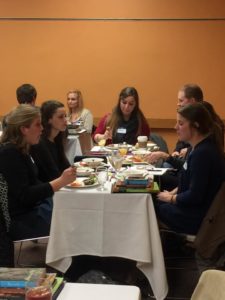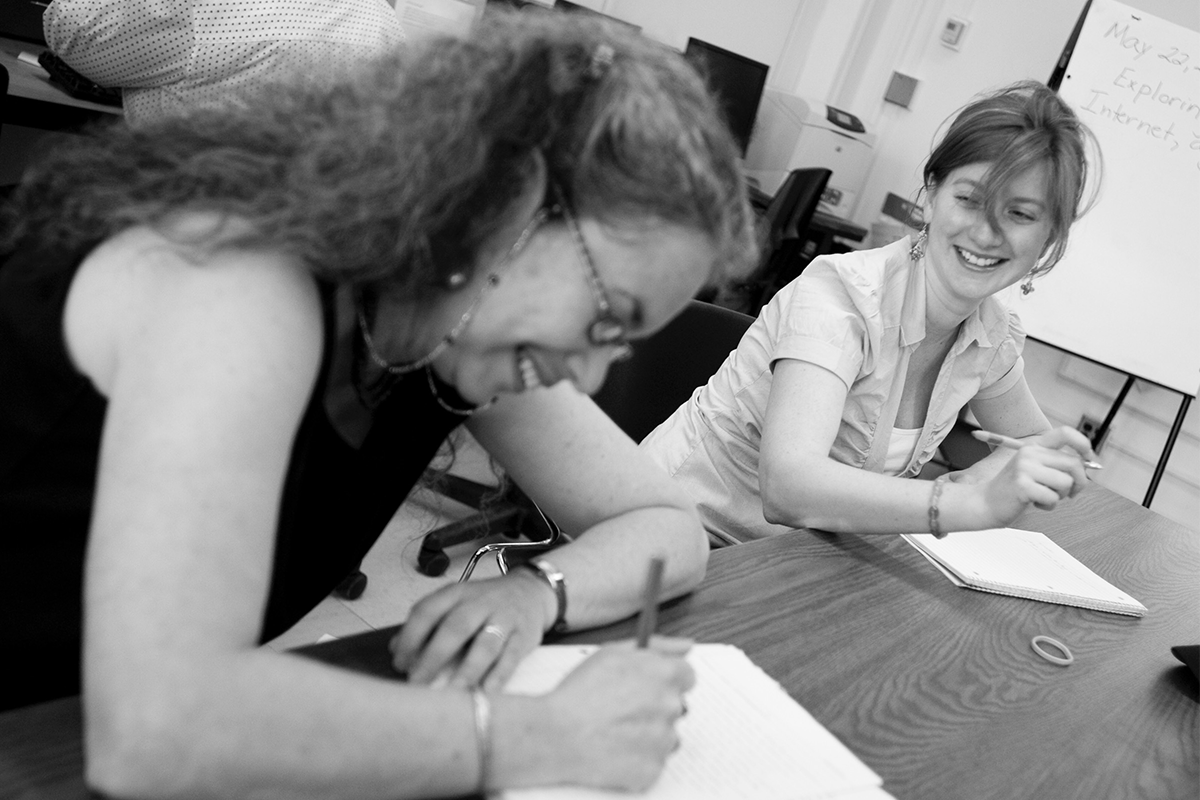When teachers hear the term “professional development,” they often think of long mandatory days of listening to speakers and administrators talk about issues that do not pertain to their teaching. I speak flippantly about these “workshops” because I endured them for over sixteen years as a middle school teacher before teaching on the university level. However, the more I work with teachers, especially through the writing project on campus, the more I realize that teachers truly want professional time to learn how to employ new pedagogical strategies to help their students. How do we, writing project sites, meet the needs of these teachers?
In the early years of my tenure as co-director of the Purchase Area Writing Project at Murray State University in Kentucky, we continued the tradition of offering an annual conference on a Friday in fall. The conferences invited writing project fellows to present new pedagogies, as well as a well-known speaker to teach and encourage classroom teachers. Because the state of Kentucky provided districts with ample funding for professional development, the attendance flourished. However, in the last five years state funding has been greatly reduced, and the problems associated with a teacher’s release from school grew: no funds for substitutes, no funds for registration, no release time due to the pressures of state assessment, and the list continued. I loved the conferences! What were we going to do? How can we sustain our outreach to area teachers effectively?
While attending the National Writing Project conference, I learned that many local sites hosted conferences and workshops on Saturdays. However, after informally surveying writing project fellows in Western Kentucky, it became very clear that the teachers truly did not want to use their Saturday for additional school-related activities. Their reasons were valid stating that Saturdays were for family, children’s ballgames, visiting relatives and a plethora of reasons. However, it was noted that many spent Sunday afternoons at school preparing for the week’s lessons.
In “Why Professional Development Matters,” Hayes Mezell states that productive professional development can occur in informal contexts, which meant that our writing project needed to be creative in offering workshops and trainings for teachers. I started brainstorming, much like a writer does when beginning a new topic, with spider webs flooding my journals to generate ideas. The time had to be perfect; the topics had to be relevant; the presenters had to be expert facilitators; the venue had to be pleasing and away from school; and the cost had to be minimal since most teachers pay their own registration. Someone might question having a venue away from school, but really? Teachers spend most of their life in the four walls of their classroom and deserve to be treated professionally outside of the school environment.
Possible venues include the following:
- college or university facilities,
- local restaurants,
- church fellowship halls,
- library meeting rooms,
- and even an individual’s home.
What finally evolved has become known as the “Twilight” PD. Why twilight? Because the events start between 4 PM and 5 PM and end between 7 PM and 8 PM. A humorous note about the name…when I first started publicizing the first “Twilight” PD, many teachers emailed asking me why I was spending an entire workshop time on a book about vampires. While I am sure Suzanne Collins might like that idea, that was far from its intent, even though there may be a session on connecting young adult literature with the classics. Thus, a new genre of professional development was born, one that provided both inservice and continuity.
The First Twilight PD
As the first evening workshop approached, I was a little nervous. After all, teachers were in the classroom all day and may not appreciate this time set aside for teacher development. I scheduled the session from 4:00 PM – 7:30 PM in Alexander Hall, which houses the College of Education and where carpeted floors and freshly painted walls would welcome the weary teachers. Our university’s food service department prepared platters of cheeses, sandwich meat, fruits and veggies, chips, and different breads, an easy meal to prepare in the classrooms. Forty-four teachers signed up for this first event, and each paid a small fee to cover the cost of the meal. The evening titled, “Re-Visiting the Common Core,” highlighted four workshops on writing and reading in the elementary and middle/high school, as well as a special session on the common core. The evening culminated with vocabulary with Brenda Overturf, author of Word Nerds.
I was surprised to see teachers from counties over an hour away, but they truly exhibited a desire to glean new strategies to use in the classroom. During the PD teachers appeared to be engaged as questions on curriculum circulated around the room, and many remained after to inquire about additional concerns with writing or reading. The simple meal filled their appetite, and the atmosphere burst with energy. The first Twilight PD was a success. A social studies teacher commented, “Why didn’t I know about these before?” The Outreach Director, Debbie Smith, and I giggled with relief as we left the building that evening.
Twilight PD Grows

An interactive notebook
Since that time, we have sponsored several Twilight PD sessions, some on selective topics and some that generated a broader audience: Standards-Based Grading, Grammar in context, Bridging the Classics with Young Adult Literature, On-Demand in other content areas, Interactive notebooks, text complexity, and visual literacy rated as the most popular subjects.
Collaborations Are Important!
Our writing project (PAWP) in collaboration with the Calloway County Public Library have also invited a few authors to share their skills and strategies for writing including George Ella Lyon, Sharon Draper, and Will Hillenbrand. George Ella, after working in area schools, swept teachers into a world of personal writing in another Twilight PD as teachers arrived at 5:00 PM to a white napkin meal. Using the floor plans of their houses, George Ella, tugged at memories that were long forgotten: sitting in granddaddy’s lap reading on the porch swing, helping grandma snap beans, and playing board games with siblings. Teachers, many PAWP-fellows, reignited a passion for writing that had been long buried with assessment mandates and school responsibilities. Each left that evening renewed about their role as a writer and a teacher.
Another Twilight PD featured Will Hillenbrand, author and illustrator, who captured the teachers with his ability to relate stories visually using a large screen and iPad. He shared that before every writing authors have a visual or a picture of the story they want to retell. This affirmation of using art with writing provided a number of strategies for teachers.

Teachers enjoying the evening of professional networking
PAWP has also established a collaborative relationship with the Murray State Shakespeare Festival’s endeavors, which culminates with a Shakespearean comedy or tragedy presented by the American Shakespeare Company. PAWP held Twilight PD’s to empower teachers to teach complex text effectively, and used the play featured in the upcoming Shakespeare Festival as one of the texts. I originally feared having low attendance, but middle and high school teachers attended to glean strategies for comprehending characterization, plot development, inferred settings, and more. “It feels like Christmas,” commented one of the teachers referring to the number of handouts, resources, and interactive strategies each teacher received.
What Now?
As another school year approaches, PAWP is surveying teachers and administrators about topics they would like to see addressed in the Twilight sessions. For now…the Twilight PDs are working, but I know without a doubt, that new avenues of teacher training must be pursued to sustain our vision, PAWP’s vision…the NWP’s vision.
By Debbie Bell, PhD
Co-Director, Purchase Area Writing Project
